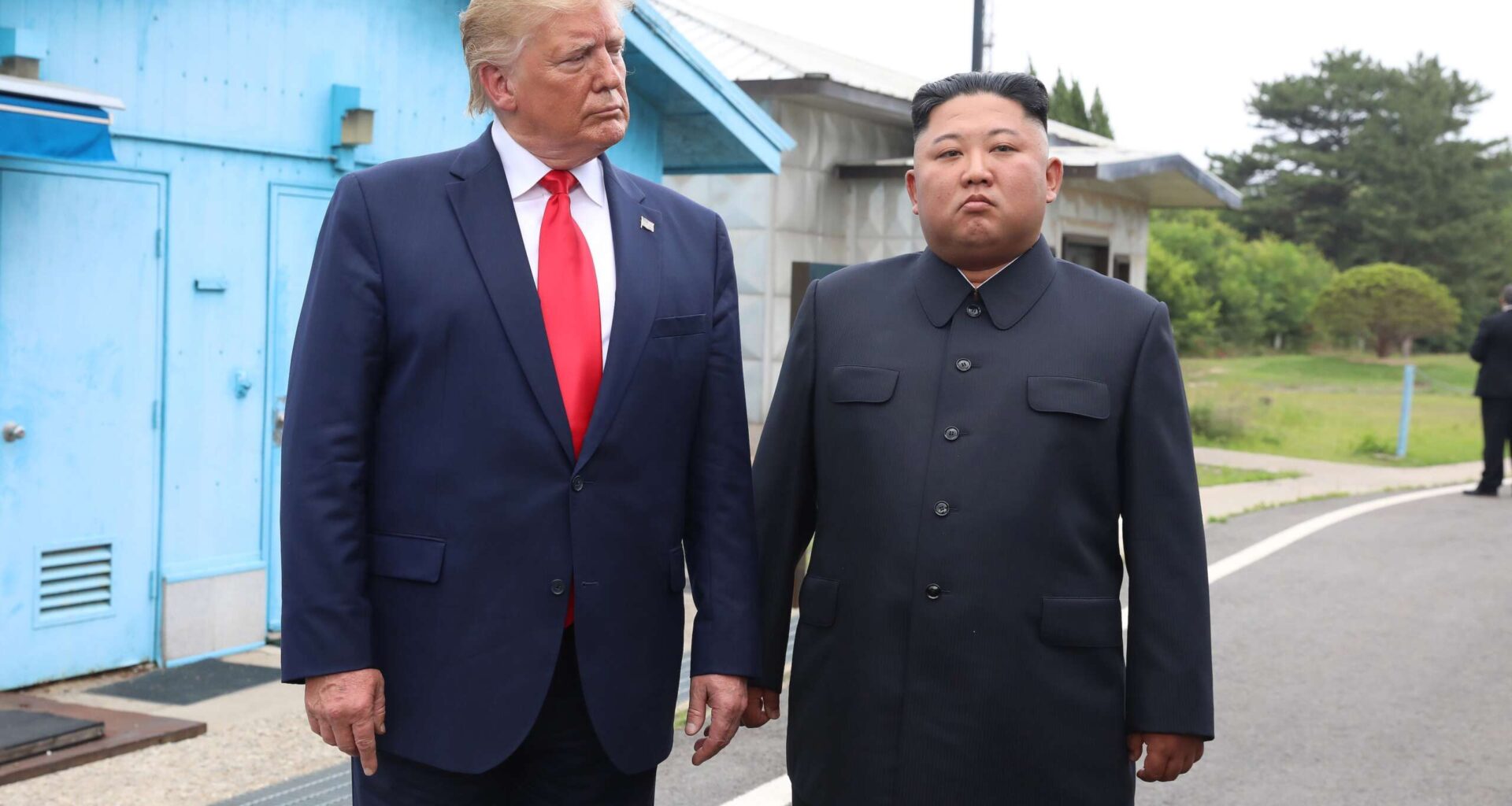The smoke over Iran may have cleared, but the aftershocks of the U.S. and Israel’s unprovoked attack are still reverberating. In one fell swoop, Washington conclusively demonstrated its total unreliability as a diplomatic partner. The lessons of this moment are being metabolized by heads of state across the world, including on the Korean Peninsula, where Donald Trump’s overtures for renewed dialogue with the Democratic People’s Republic of Korea (DPRK) have so far been rebuffed.
Trump’s flashy promises that he would revive the diplomatic process with Pyongyang never had much merit. The previous round of talks under his first administration significantly harmed the chances of future negotiations. Kim Jong Un’s recent decision to reject a personal letter from the U.S. president was only the latest indication of this. While Trump has vowed to “get the conflict solved with North Korea,” observers would do well to understand that North Korea places little value in the “personal relationship” between Kim and Trump that has been a focal point of much media chatter. Pyongyang’s official response to Trump’s election campaign pronouncements made this clear: “The foreign policy of a state and personal feelings must be strictly distinguished. For nearly 80 years since the founding of the DPRK, the U.S. has pursued the most vicious and persistent hostile policy toward it.”
For North Korea, talks with Trump were nothing novel, just the latest in a series of diplomatic engagements going back to the Clinton administration. Once again, Pyongyang discovered that the U.S. would treat negotiations as a shakedown, rather than as a dialogue. At the 2019 Hanoi Summit, the North Korean delegation departed abruptly upon realizing the U.S. had no interest in lifting its blockade. Since then, the DPRK has formalized its stance that its nuclear weapons are not up for negotiation with foreign powers. Diplomatic resolution with the U.S., once a key objective of DPRK foreign policy, is no longer considered desirable until Washington changes its “hostile policy” of sanctions, constant war drills, and attempts at domestic interference.
Get the latest news and thought-provoking analysis from Truthout.
Trump’s attack on Iran will now cement this position. Israel technically struck Iran first, but this hardly matters to Pyongyang, and it shouldn’t matter to the rest of us either. The facts speak for themselves. The U.S. was engaged in diplomatic talks with Iran when, on the verge of an agreement, Washington provided logistical and tactical support for Israel’s unprovoked and illegal attack on military and civilian targets that killed hundreds of people. Israeli officials contested White House claims that they had acted alone, saying they received a “green light” from the president himself. Sen. Ted Cruz, in a now-viral gaffe, felt there was such little distinction between Israel and the U.S. that he simply told Tucker Carlson, “We are striking Iran.”
The lesson is clear for observers around the world: Washington’s word cannot be trusted, and diplomacy could even be a fig leaf masking its real strategy of coercion or aggression.
A pro-peace presidential candidate offers a historic opening to transform the front line of a new Cold War.
The echoes of Iraq in Trump’s attack on Iran have already been widely commented on, and the resemblance will likely not be lost on Pyongyang either. In the early 2000s, the U.S. could have convinced North Korea to avoid nuclear armament; a prior agreement to do so under Clinton already existed, but the U.S. was late on fulfilling its vows to provide North Korea with civilian nuclear technology and normalization of relations. Instead of following through on these promises, the George W. Bush administration branded North Korea part of an “Axis of Evil” and launched its “war on terror” in Afghanistan and Iraq. Iraq, in particular, was instructive. Prior to the U.S. invasion, the Iraqi government opened its doors to international weapons inspectors and voluntarily dismantled parts of its missile arsenal. In the end, this did nothing to deter Washington. In fact, had Iraq stood defiant against Washington’s pressure, or even actually pursued weapons of mass destruction, its sovereignty might have been protected, and millions of people in the region might still be alive, or never displaced from their homes. Eight years later, Obama’s disastrous intervention in Libya, a country that had previously surrendered its nuclear program in diplomatic talks, reinforced these lessons. Iran’s experience simply consolidates a thesis that, from Pyongyang’s vantage, has already been vindicated by history.
The case of Iran also carries special implications for the Korean Peninsula, given the military cooperation between the DPRK and the Islamic Republic. Pyongyang has an extensive history as a military and political actor in West Asia. In keeping with its own roots as an anti-imperialist, socialist state, North Korea directly aided political movements confronting Zionism and imperialism in the region, including Nasserist Egypt, various Arab socialist parties (including within the Palestinian Resistance), and the Islamic Republic of Iran. North Korea is one of the few countries anywhere that has never recognized the state of Israel, and only one of a handful of non-Muslim countries in this category. In the case of Iran, North Korea was a military trading partner that helped arm the fledgling Islamic Republic during a devastating U.S.-backed invasion by Saddam Hussein’s Iraq in the 1980s. Iran’s ballistic missile arsenal was built from native adaptations of North Korean designs; U.S. intelligence has also long claimed Iran’s nuclear facilities bear the fingerprints of North Korean assistance. According to a 2006 report by Robert Hughes in Jane’s Defense Weekly, which has henceforth been cited in Congressional Research Office reports, North Korea assisted in the design and construction of Iran’s various underground nuclear facilities, dispatching technical experts to oversee the project in 2005. North Korea itself houses an underground labyrinth of military and civilian facilities that date back to the Korean War, when this technology was developed out of necessity to shield the population from Washington’s genocidal bombing.
The truth of how each side performed militarily may not be known to the wider world for some time, but this latest war was nonetheless a trial run for how DPRK military technologies could fare in a showdown with the United States. Iran’s ballistic missiles, particularly its hypersonics, proved capable of shattering Israel’s Iron Dome in addition to THAAD, a U.S. missile defense system stationed in both Israel and South Korea. Meanwhile, Trump’s claims to have “obliterated” Iran’s nuclear facilities seem to be pure bluster. The New York Times, citing U.S. intelligence, reported that while ventilation tunnels at Fordow were damaged, the underground facility, which is the most deeply buried of all known Iranian nuclear sites, remained intact. If Fordow indeed remains operational, then a new picture of the U.S. and DPRK’s relative military capabilities emerges. The 30,000-pound GBU-57 A/B Massive Ordnance Penetrator “bunker buster” bomb saw its first-ever combat usage at Fordow. If a dozen of these weapons couldn’t collapse the Fordow complex, then it is likely that North Korea’s most heavily defended subterranean structures are also impervious to them.
Routine U.S. threats to “totally destroy” North Korea (in Trump’s words) or to bring about the “end of [the] regime” (in Biden’s) would now seem far less substantiated. But if Trump’s current behavior is any indication, the tough talk will probably continue — and Pyongyang will not treat any future threats idly. Iran is also part of an emerging pattern in how the new administration might conduct future wars. Trump’s prior attempt at regime change in Yemen, initially planned as an eight-month operation, was cut short just 52 days in, after killing unprecedented numbers of Yemenis but achieving no strategic aims. This assault on Iran was even shorter, not even lasting two weeks (though future attacks cannot be ruled out). If a cohesive Trump Doctrine ever emerges, the use of short-term, highly opportunistic violence may be one of its pillars. For as long as Washington and Pyongyang began engaging in dialogue since the George H. Bush administration, U.S. presidents have frequently entertained the possibility of limited strikes on North Korea, including Trump in his first administration. Even with his strikes on Iran likely to be deemed a military failure, Trump now seems more, not less, likely to repeat this pattern elsewhere.
For North Korea, drawing the correct lessons from the U.S.-Israeli attack on Iran is an existential matter. U.S. coercion in Korea and around the world is at untenable levels, with no substantial benefit for the U.S. population, not to mention the rest of humanity. The U.S. military conducted 275 days of war games in Korea last year; this year, even more war games are scheduled, and a military disaster in March already wounded dozens of people and damaged hundreds of buildings in the border village of Nogok-ri. Washington and Seoul call these military drills “defensive” in their public communications, but a recent report from the Atlantic Council gives us a more honest view. In its assessment of the recent Guardian Tiger I & II tabletop exercises, the think tank concludes that the U.S. must be prepared to fight a simultaneous nuclear war with China and North Korea, and that rather than doing everything possible to prevent this, Washington should “prepare for the possibility of a limited nuclear attack” on U.S. soil. Today, the chairpersons of both the Senate Armed Services and Foreign Relations Committees are calling to redeploy U.S. nukes to the peninsula.
Democrats and Republicans are mostly united in their hostility towards Iran and North Korea alike, but the people of the U.S. must be more astute. The DPRK will never answer hostility with meekness, but it might reciprocate genuine gestures of peace and solidarity. Those signals won’t come from Washington or Wall Street — it will be up to the people of this country to send that message instead. The call to action is simple: U.S. out of Korea, out of West Asia, and everywhere.
With Trump’s fascist agenda driving the narrative, it’s the duty of independent media to disrupt corporate propaganda.
Yet, at such a pivotal moment, donations to Truthout have been declining. Why? Blatant political censorship from Big Tech.
As we face mounting repression, Truthout appeals for your support. Please donate during our fundraiser — we have 5 days left to raise $36,000.
This article is licensed under Creative Commons (CC BY-NC-ND 4.0), and you are free to share and republish under the terms of the license.
On Bluesky? We created a starter pack to make it easy for you to follow Truthout folks there.

